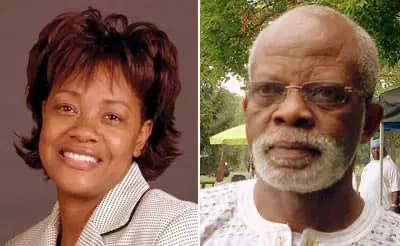
L-R: Cheryl and Professor Chukwudubem Okafor
Introduction: A Tragedy Foretold
On a sunny Sunday in 2009, Professor Chukwudubem Okafor, a respected Nigerian academic and poet, walked into his sister’s home in Pennsylvania, carrying more than just the weight of his shattered marriage. Moments later, gunshots rang out. By the time the police arrived, he and his estranged wife, Cheryl, lay lifeless—his final act one of irreversible destruction. The Professor of English Literature had pumped bullets into Cheryl – who had arrived unsuspectingly moments earlier, ahead of him, and he later ended his own life with a single shot into the head.
The news shocked those who knew him. How could an accomplished intellectual, a man of letters, descend into such darkness? But those who truly understood saw it differently: this was not the impulsive act of a madman. It was the culmination of years of unspoken pain, isolation, and the slow unraveling that turns love into war.
More than a decade and a half later, another tragedy unfolded. In January 2025, Dr. Ikenna Erinne, a well-respected Nigerian-American cardiologist, took his own life in Texas. His suicide was linked to the brutal realities of divorce and child support—a story all too familiar in the lives of men caught in the crossfire of broken relationships. The initial reports suggested the doctor was ordered to pay $15,000 per month in child support for his special needs child, a claim his father-in-law later contested, saying the amount was actually $1,900. But the truth was already clear—he was struggling under the weight of a system that often leaves men feeling trapped and disposable.
And then there’s Tuface and Annie Macaulay. Their case may not have ended in bloodshed, but the public unraveling of their marriage mirrors the same pattern: the slow descent from love to toxicity, the erosion of trust, the helplessness of a man caught in a storm he can’t control. While some dismiss the latest drama as a publicity stunt, those who look closer can see the cracks—another man silently drowning in the expectations placed on him.
These stories are not isolated incidents. They are symptoms of a much larger issue: the forgotten pain of men.
Why Do Good Relationships Turn Toxic?
No one enters a marriage expecting it to end in resentment or tragedy. Yet, so many do. The slow unraveling of a relationship often follows a predictable pattern—small resentments left unaddressed, communication breaking down, emotional needs going unmet, until one or both parties become unrecognizable versions of themselves.
For men, the process is often silent. Society teaches them to endure, to provide, to protect—never to complain. When cracks begin to form in their relationships, they are conditioned to “man up” and push through. But suppression is not strength. It is a ticking time bomb.
Emotional isolation plays a significant role in this breakdown. Unlike women, who often have strong emotional support networks, many men find themselves alone in their struggles.
In African cultures, extended family and community elders often mediate conflicts, but in the diaspora, that support system disappears. The man is left to navigate unfamiliar cultural shifts alone, often facing a legal system that is already predisposed against him.
The Legal and Cultural Trap: A Global Struggle for Men
For many African men in the diaspora, the transition from traditional family structures to Western legal systems can be jarring. Back home, marital conflicts are often settled through dialogue, family intervention, or religious mediation. But abroad, legal institutions take precedence, and those institutions are rarely in favor of men.
But this problem is not exclusive to African men. Across different cultures, men face similar systemic disadvantages when marriages break down:
• Hispanic & Asian Communities: Studies show that Latino and Asian men in Western countries often experience the same struggles. In many of their home countries, family is central, and extended relatives help mediate disputes. But in the West, they are subjected to a cold legal process where divorce often favors the woman.
• White Men in the West: Even among Caucasian men in the UK and US, there is a growing movement against what some call “divorce discrimination”—where men lose their homes, access to their children, and financial stability overnight. This has fueled the rise of Men’s Rights Activism (MRA) in Western countries.
• The Middle Eastern Struggle: Middle Eastern men, who often come from patriarchal societies, find it particularly difficult to adjust to Western legal frameworks that remove their authority in marriage and, in some cases, grant their wives complete control over marital assets.In every case, men are often the ones forced out of the family home, burdened with child support, and emotionally alienated from their children.
Key Systemic Disadvantages for Men Globally
• *Child Support & Custody Battles*: Studies show that in most divorce cases, mothers are more likely to receive custody of children. This means fathers not only lose daily contact with their kids but are also burdened with heavy financial obligations. In cases like Dr. Ikenna’s, whether the mandated child support was $1,900 or $15,000, the weight of that responsibility—combined with the emotional toll of separation—can be overwhelming.
• Loss of Home & Assets: According to research, 60% of men lose their homes post-divorce, compared to only 21% of women. This is due to laws that often favor women in property disputes, granting them automatic occupancy of the matrimonial home, regardless of ownership.
• *The Weaponization of Women Empowerment Laws*: While women’s rights movements have done remarkable work in addressing gender-based injustices, there is an uncomfortable truth that some women exploit these laws as leverage in personal conflicts. False allegations of abuse, strategic restraining orders, and manipulative legal maneuvers often place men at an immediate disadvantage. The presumption of guilt can ruin careers, reputations, and mental well-being. As we all saw during my own personal experience with the false allegations that led to a wrongful conviction and eventual exoneration!In this landscape, many men feel trapped. They are not just fighting to save their relationships but also to preserve their dignity, financial stability, and, in many cases, their very existence.
The Quiet Desperation of Men
Men rarely speak about their pain. When they do, they are often met with dismissiveness or ridicule. “Why didn’t he just walk away?” people ask when a man reaches his breaking point. But where was he supposed to go? Who was he supposed to turn to?
In Africa, when a marriage collapses, a man often has his brothers, uncles, and elders to fall back on. Abroad, he has a lawyer, a judge, and a monthly invoice for child support. The difference is devastating.
I know this pain firsthand. Having gone through two failed marriages, I understand the silent battles men fight. The nights spent replaying every argument, the financial strain that never seems to end, the gnawing sense of failure. You do everything right, yet you are the villain in someone else’s story.
This is the reality of so many men today—good men, loving fathers, dedicated husbands—slowly broken by a system that sees them as nothing more than providers, while their emotional well-being remains an afterthought.
Conclusion: Watch Out for Part 2
What happened to Prof. Okafor, Dr. Ikenna, and countless others, should not be seen as isolated tragedies but as warning signs. If we do not address the silent suffering of men, we will continue to see more of these stories unfold.
But where can men turn for help? What resources exist for those on the edge? How can we create a system that does not just punish men for failing but supports them in their struggles?
These are the questions we must answer.
In Part 2, I will explore where men can seek help, the importance of mental health awareness, and the resources that can prevent these tragedies before they happen.
Because men deserve support too.
Dr Femi Olaleye

Thanks Dr Femi for this article, and thanks also for sharing your own experience, it makes the article even more poignant.
I look forward to Part 2 for information on where men can seek help and the resources that can help husbands and wives prevent these tragedies before they happen.
Thanks & God bless
Mr olaleye I hope you have learned your lessons from your 2 failed marriages as you stated again accountability remains the patchwork perhaps if you come out clean and share your truth a lot more men will learn. And not make the same mistakes your did. I put it to you based on all we read and saw about you you were only exonerated by a failed judiciary system you manipulated and wriggled out of. You are not innocent as you claim ! Be that as it may sharing your truth ‘ truthfully may help in the advocacy route you have chosen ! Because don’t forget the trail of broken children your actions and inactions has left and dangerous damage your inability to recognise and own your truth has caused all those who were * unfortunate * to know you or crossed your path. First step is own your truth! Remove the pickle in your eyes before you do for others. My 2 cents.